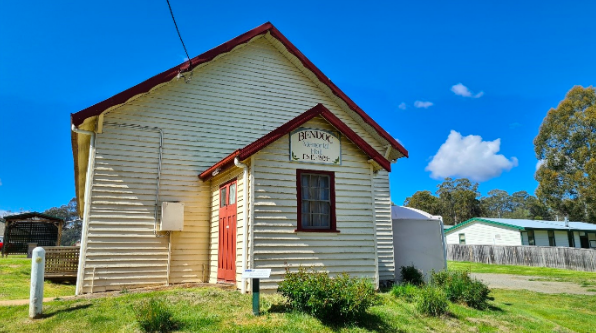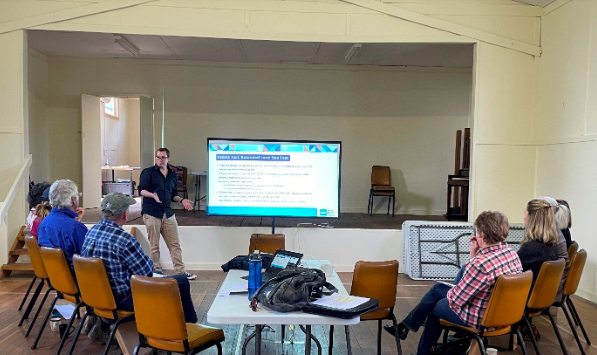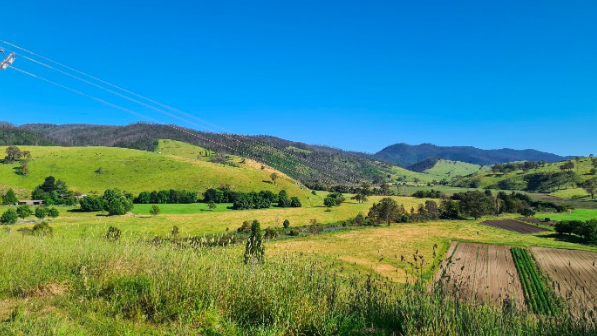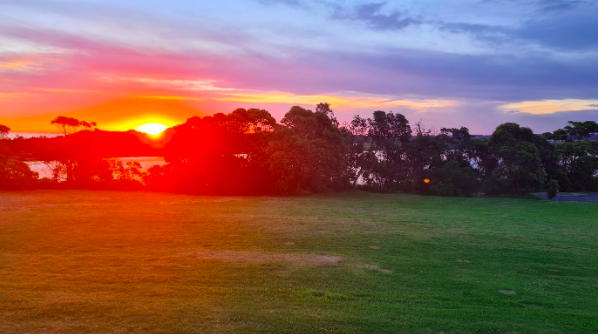By Dermott Williams

SSRV would like to thank Gippsland Community Legal Service – and in particular, Simone Elias – for inviting us to be part of the 2021 Farm Succession Planning Days and bringing this opportunity to life.
At the start of December 2021, I was fortunate enough to have had an opportunity for outreach in East Gippsland as part of our Bushfire Response Project. I’d like to take a moment to share a little about that experience, what we did, and what I learned from the experience.
Farm Succession Planning Days
Farm succession is an important issue for farmers and rural communities. What exactly happens when a farmer decides it’s time to stop personally working their land, and maybe give the next generation a go? What are the implications? How wide is the impact? And most importantly, how do you plan for it?
It was this we were hoping to help with as part of Bushfire Recovery Victoria’s Farm Succession Planning Days. Along with other legal and financial organisations working in the area, I presented at a series of sessions across East Gippsland, ranging from Bendoc and Bonang near the New South Wales border, to Genoa and Cann River in the east, and Gelantipy and Buchan in the hills west of the Snowy River.
My contribution was around Age Pension eligibility, and the special rules and particular circumstances that come up for farmers. As we were informed when planning the events, and was confirmed during the sessions themselves, Centrelink isn’t an option many farmers even consider.
“They won’t give me the pension, my farm is worth too much.”
But as it turns out, there are some very specific rules to make it easier for farmers in these situations to access the age pension. And that was my goal with these sessions. To raise awareness and give farmers more options to consider.
“Thank you. I would not have considered that as an option before speaking with you.”
The Farm Succession Planning Days were a great success, with farmers walking away with more options than they had before, both in this sphere and in those of the other presenters.

Reaching our to Rural Communities
What I found interesting were the differences between the farmers in each community. They each had a different feel and it was obvious that some were closer than others. It was also clear that each community had different issues on their minds, with some more focussed on ownership structures for their farms, and others very interested in enduring powers of attorney.
What was less surprising were the similarities. These were people who would outright tell you they were unlikely to pick up a phone and call you for help. Not if they haven’t met you before. Not if they can’t put a face to the name. And for me personally, that was the most valuable part of the trip: Making a connection with a cohort of people who would otherwise have difficulty accessing our service. I’m hopeful there will be more opportunities like this in the future for exactly this reason.

Responding to Bushfires as a Lawyer
I grew up in West Gippsland, so travelling down this way wasn’t new to me, though I hadn’t been this far east before. Something else that wasn’t exactly new was seeing the damage from fires. And yet, getting up close with it, even almost two years after Black Summer, is still confronting.
The moment that stands out to me was driving up to Gelantipy and seeing the trees that come right to the edge of the road on both sides just being completely burned out. Imagining what that must have been like at the time, if one was unlucky enough to find themselves stuck driving through that still elicits a strong emotional response.
The farmers’ own stories were far more confronting. Whether it was recounting their efforts to defend property, making the choice to stay or go, or just describing exactly how fast the fires could race up a hill. It was clear from the many conversations I had over the week, that just like the marks on the land, there will still marks on the people too.
And there were still practical – and legal – problems to solve. Fencing disputes, insurance issues, the Centrelink assets test, rebuilding, and accessing the Age Pension just to name a few. Working in this role I’ve seen the legal needs of bushfire affected people change over time. There’s a great demand for services – both on the ground and the specialists supporting them – to be resourced and ready to meet those needs at the time of an acute crisis. But disaster response doesn’t end there. Sometimes that help needs to come later, and sometimes it needs to be more general, to help a community get back on its feet holistically, and not just rebuild in the literal sense.
And that would be my final reflection on this trip. As community lawyers practising in a very specialised area we can’t solve every problem those affected by bushfires have. But with the right resources and approaches in place there is a role to be played and good to be done.
Plus it means you get to travel to some absolutely beautiful places.





